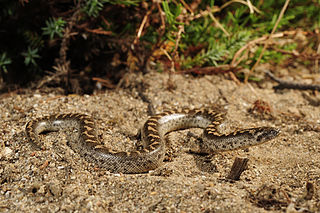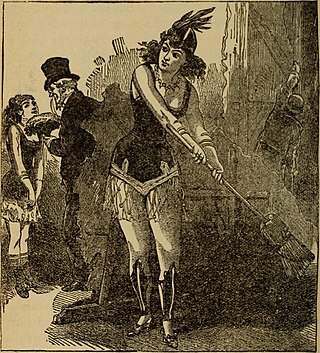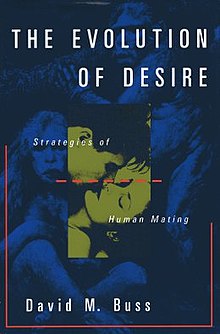
Evolutionary psychology is a theoretical approach in psychology that examines cognition and behavior from a modern evolutionary perspective. It seeks to identify human psychological adaptations with regards to the ancestral problems they evolved to solve. In this framework, psychological traits and mechanisms are either functional products of natural and sexual selection or non-adaptive by-products of other adaptive traits.

Sexual attraction is attraction on the basis of sexual desire or the quality of arousing such interest. Sexual attractiveness or sex appeal is an individual's ability to attract other people sexually, and is a factor in sexual selection or mate choice. The attraction can be to the physical or other qualities or traits of a person, or to such qualities in the context where they appear. The attraction may be to a person's aesthetics, movements, voice, or smell, among other things. The attraction may be enhanced by a person's adornments, clothing, perfume or style. It can be influenced by individual genetic, psychological, or cultural factors, or to other, more amorphous qualities. Sexual attraction is also a response to another person that depends on a combination of the person possessing the traits and on the criteria of the person who is attracted.

Seduction has multiple meanings. Platonically, it can mean "to persuade to disobedience or disloyalty", or "to lead astray, usually by persuasion or false promises".

Sociobiological theories of rape explore how evolutionary adaptation influences the psychology of rapists. Such theories are highly controversial, as traditional theories typically do not consider rape a behavioral adaptation. Some object to such theories on ethical, religious, political, or scientific grounds. Others argue correct knowledge of rape causes is necessary for effective preventive measures.

David Michael Buss is an American evolutionary psychologist at the University of Texas at Austin, researching human sex differences in mate selection. He is considered one of the founders of evolutionary psychology.

Parental investment, in evolutionary biology and evolutionary psychology, is any parental expenditure that benefits offspring. Parental investment may be performed by both males and females, females alone or males alone. Care can be provided at any stage of the offspring's life, from pre-natal to post-natal.

A psychological adaptation is a functional, cognitive or behavioral trait that benefits an organism in its environment. Psychological adaptations fall under the scope of evolved psychological mechanisms (EPMs), however, EPMs refer to a less restricted set. Psychological adaptations include only the functional traits that increase the fitness of an organism, while EPMs refer to any psychological mechanism that developed through the processes of evolution. These additional EPMs are the by-product traits of a species’ evolutionary development, as well as the vestigial traits that no longer benefit the species’ fitness. It can be difficult to tell whether a trait is vestigial or not, so some literature is more lenient and refers to vestigial traits as adaptations, even though they may no longer have adaptive functionality. For example, xenophobic attitudes and behaviors, some have claimed, appear to have certain EPM influences relating to disease aversion, however, in many environments these behaviors will have a detrimental effect on a person's fitness. The principles of psychological adaptation rely on Darwin's theory of evolution and are important to the fields of evolutionary psychology, biology, and cognitive science.

Sexual jealousy is a special form of jealousy in sexual relationships, based on suspected or imminent sexual infidelity. The concept is studied in the field of evolutionary psychology.
Human male sexuality encompasses a wide variety of feelings and behaviors. Men's feelings of attraction may be caused by various physical and social traits of their potential partner. Men's sexual behavior can be affected by many factors, including evolved predispositions, individual personality, upbringing, and culture. While most men are heterosexual, significant minorities are homosexual or varying degrees of bisexual.
Sexual selection in humans concerns the concept of sexual selection, introduced by Charles Darwin as an element of his theory of natural selection, as it affects humans. Sexual selection is a biological way one sex chooses a mate for the best reproductive success. Most compete with others of the same sex for the best mate to contribute their genome for future generations. This has shaped human evolution for many years, but reasons why humans choose their mates are not fully understood. Sexual selection is quite different in non-human animals than humans as they feel more of the evolutionary pressures to reproduce and can easily reject a mate. The role of sexual selection in human evolution has not been firmly established although neoteny has been cited as being caused by human sexual selection. It has been suggested that sexual selection played a part in the evolution of the anatomically modern human brain, i.e. the structures responsible for social intelligence underwent positive selection as a sexual ornamentation to be used in courtship rather than for survival itself, and that it has developed in ways outlined by Ronald Fisher in the Fisherian runaway model. Fisher also stated that the development of sexual selection was "more favourable" in humans.
In sexual relationships, concepts of age disparity, including what defines an age disparity, have developed over time and vary among societies. Differences in age preferences for mates can stem from partner availability, gender roles, and evolutionary mating strategies, and age preferences in sexual partners may vary cross-culturally. There are also social theories for age differences in relationships as well as suggested reasons for 'alternative' age-hypogamous relationships. Age-disparate relationships have been documented for most of recorded history and have been regarded with a wide range of attitudes dependent on sociocultural norms and legal systems.
Joseph Carroll is a scholar in the field of literature and evolution. He received his PhD in Comparative Literature from the University of California, Berkeley and is now Curators’ Distinguished Professor Emeritus at the University of Missouri–St. Louis.
The theoretical foundations of evolutionary psychology are the general and specific scientific theories that explain the ultimate origins of psychological traits in terms of evolution. These theories originated with Charles Darwin's work, including his speculations about the evolutionary origins of social instincts in humans. Modern evolutionary psychology, however, is possible only because of advances in evolutionary theory in the 20th century.

The Evolution of Human Sexuality is a 1979 book about human sexuality by the anthropologist Donald Symons, in which the author discusses topics such as human sexual anatomy, ovulation, orgasm, homosexuality, sexual promiscuity, and rape, attempting to show how evolutionary concepts can be applied to humans. Symons argues that the female orgasm is not an adaptive trait and that women have the capacity for it only because orgasm is adaptive for men, and that differences between the sexual behavior of male and female homosexuals help to show underlying differences between male and female sexuality. In his view, homosexual men tend to be sexually promiscuous because of the tendency of men in general to desire sex with a large number of partners, a tendency that in heterosexual men is usually restrained by women's typical lack of interest in promiscuous sex. Symons also argues that rape can be explained in evolutionary terms and feminist claims that it is not sexually motivated are incorrect.
Mate preferences in humans refers to why one human chooses or chooses not to mate with another human and their reasoning why. Men and women have been observed having different criteria as what makes a good or ideal mate. A potential mate's socioeconomic status has also been seen as having a noticeable effect, especially in developing areas where social status is more emphasized.

In evolutionary psychology and behavioral ecology, human mating strategies are a set of behaviors used by individuals to select, attract, and retain mates. Mating strategies overlap with reproductive strategies, which encompass a broader set of behaviors involving the timing of reproduction and the trade-off between quantity and quality of offspring.
Mate value is derived from Charles Darwin's theory of evolution and sexual selection, as well as the social exchange theory of relationships. Mate value is defined as the sum of traits that are perceived as desirable, representing genetic quality and/or fitness (biology), an indication of a potential mate's reproductive success. Based on mate desirability and mate preference, mate value underpins mate selection and the formation of romantic relationships.
Female intrasexual competition is competition between women over a potential mate. Such competition might include self-promotion, derogation of other women, and direct and indirect aggression toward other women. Factors that influence female intrasexual competition include the genetic quality of available mates, hormone levels, and interpersonal dynamics.
Social selection is a term used with varying meanings in biology.

Human mate guarding refers to behaviours employed by both males and females with the aim of maintaining reproductive opportunities and sexual access to a mate. It involves discouraging the current mate from abandoning the relationship whilst also warding off intrasexual rivals. It has been observed in many non-human animals, as well as humans. Sexual jealousy is a prime example of mate guarding behaviour. Both males and females use different strategies to retain a mate and there is evidence that suggests resistance to mate guarding also exists.











